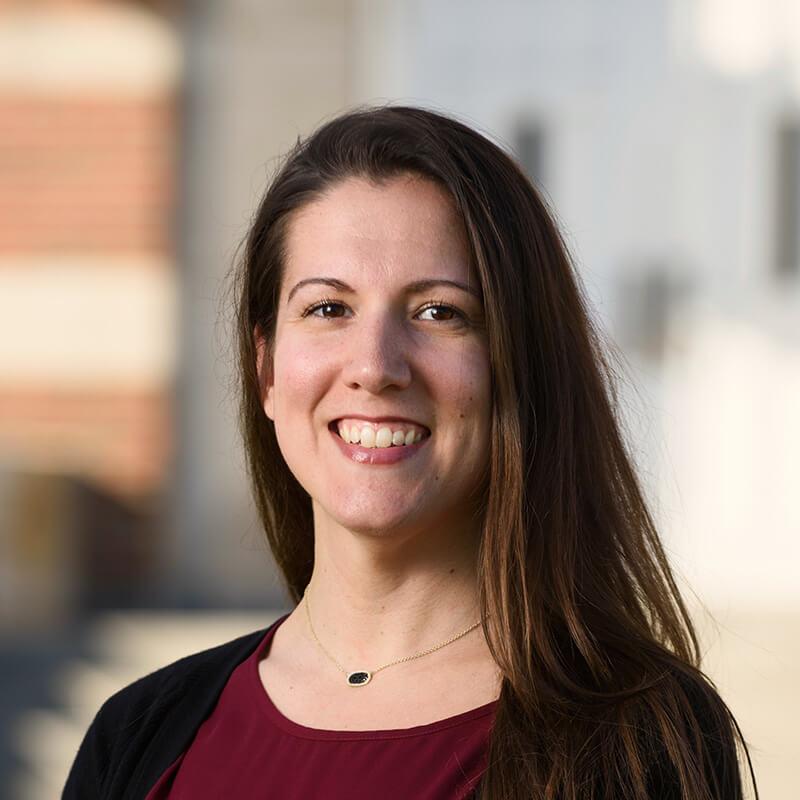- Ph.D. in Child and Family Studies from Syracuse University
- M.S. in Child and Family Studies from Syracuse University
- B.S. in Psychology and History from Clarkson University
Department of Counseling, Human Development and Family Science
BIO
Nicole Conroy, Ph.D., is an Assistant Professor in the Human Development and Family Science (HDFS) program. Her research and teaching center on the contextual and transactional nature of human development and relationships, with a focus on strengths-based perspectives to promote positive development and healthy relationships. She has taught courses on power and interpersonal violence, human sexuality, research methods, family theories, and human development. She also contributes to several community-engaged learning opportunities for students, including teaching the program’s core civic learning course and mentoring undergraduates in student-led, applied research projects. She also serves on the UVM Community-Engaged Learning Advisory Committee.
Dr. Conroy's scholarship broadly examines the intersections of gender, power, control, and violence. Her current research explores the validity and practical utility of Johnson’s (2008) control-based typology of intimate partner violence; the role of gender in young adults’ experiences of dating violence; and stakeholder perspectives of university responses to sexual assault. Her work often includes collaborations with undergraduate and graduate students, campus stakeholders, and community partners.
Publications
Awards and Achievements
- John Dewey Award for Excellence in Teaching, College of Education and Social Services, University of Vermont (2022)
- Outstanding New Community-Engaged Learning Faculty Award, Office of Community-Engaged Learning, University of Vermont (2020)
- Martha Trescott Prize (Ettinger et al., 2019), Society for the History of Technology (2020)
- Doctoral Research Prize, David B. Falk College, Syracuse University (2017)
Area(s) of expertise
- Power, control, and intimate partner violence
- Gender and intimate partner violence
- Sexual coercion, violence, and consent
- Human development and identity
Bio
Nicole Conroy, Ph.D., is an Assistant Professor in the Human Development and Family Science (HDFS) program. Her research and teaching center on the contextual and transactional nature of human development and relationships, with a focus on strengths-based perspectives to promote positive development and healthy relationships. She has taught courses on power and interpersonal violence, human sexuality, research methods, family theories, and human development. She also contributes to several community-engaged learning opportunities for students, including teaching the program’s core civic learning course and mentoring undergraduates in student-led, applied research projects. She also serves on the UVM Community-Engaged Learning Advisory Committee.
Dr. Conroy's scholarship broadly examines the intersections of gender, power, control, and violence. Her current research explores the validity and practical utility of Johnson’s (2008) control-based typology of intimate partner violence; the role of gender in young adults’ experiences of dating violence; and stakeholder perspectives of university responses to sexual assault. Her work often includes collaborations with undergraduate and graduate students, campus stakeholders, and community partners.
Publications
Awards and Achievements
- John Dewey Award for Excellence in Teaching, College of Education and Social Services, University of Vermont (2022)
- Outstanding New Community-Engaged Learning Faculty Award, Office of Community-Engaged Learning, University of Vermont (2020)
- Martha Trescott Prize (Ettinger et al., 2019), Society for the History of Technology (2020)
- Doctoral Research Prize, David B. Falk College, Syracuse University (2017)
Areas of Expertise
- Power, control, and intimate partner violence
- Gender and intimate partner violence
- Sexual coercion, violence, and consent
- Human development and identity
